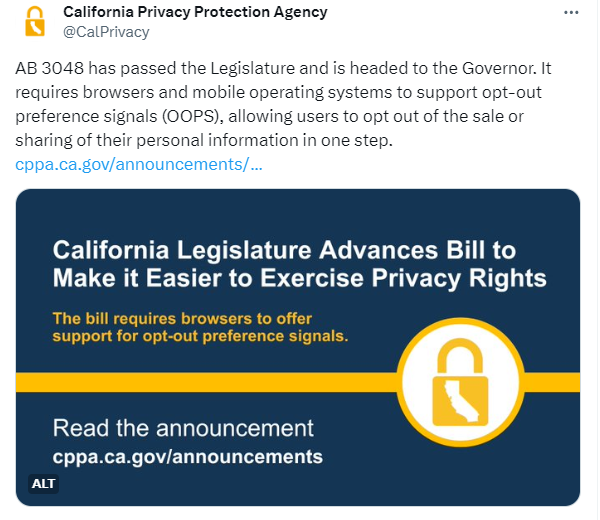The Golden State is doubling down on tech regulation with a new privacy bill requiring browsers and mobile systems to include an “opt-out preference signal,” allowing users to easily decline data sharing. This is part of a broader push by the state to exert control over the tech industry, similar to its recent efforts to regulate AI technologies.
These moves are not without controversy, as they highlight the state’s willingness to impose far-reaching controls that impact tech companies nationwide. Critics argue that California’s aggressive stance can stifle innovation and create a patchwork of regulations that complicate compliance.

The state’s approach reflects its belief that stronger regulatory oversight is needed to safeguard consumer rights and manage the risks of emerging technologies, even as it sparks debate over the balance between regulation and technological growth.
Why it matters: California’s aggressive tech legislation reflects its broader intent to lead on technology oversight, sparking national debate and pushing the boundaries of regulatory influence. As other states look to California’s example, the ripple effects could lead to a more complex regulatory environment nationwide, influencing how tech operates across the country.

- State vs. Federal Dynamics: California’s privacy bill highlights the state’s tendency to act independently when it comes to regulating tech, often filling gaps that federal laws have yet to address. This independence can create conflicts between state and federal regulations, forcing businesses to navigate a complex legal landscape and adapt quickly to varying requirements.
- Industry Pushback and Economic Concerns: Many businesses, especially those relying on data monetization, argue that California’s stringent privacy regulations could stifle innovation and lead to significant compliance costs. Critics warn that such regulations may drive tech companies to reconsider their operations in the state, potentially impacting California’s economy.
- Precedent for National Standards: California’s regulatory actions frequently set a national benchmark, with other states often following suit. The new privacy bill could inspire similar legislation elsewhere, leading to a fragmented patchwork of regulations across the U.S. that companies must adapt to, further complicating compliance efforts on a national scale.
- Simplification of Privacy Controls: By mandating that browsers and mobile systems integrate opt-out mechanisms directly, the legislation addresses the current consumer struggle to navigate multiple consent forms across various platforms. This move empowers users to manage their data preferences easily, enhancing privacy but also imposing new operational challenges on tech companies.
- Legislative Intent and Broader Implications: Legislators pushing for this bill aim to strengthen consumer rights and trust in the digital marketplace, reflecting a broader intent to hold tech companies accountable for data privacy. While praised by privacy advocates, this aggressive legislative approach raises ongoing debates about balancing regulatory oversight with maintaining a competitive tech environment in California.





